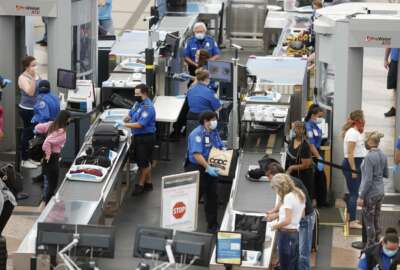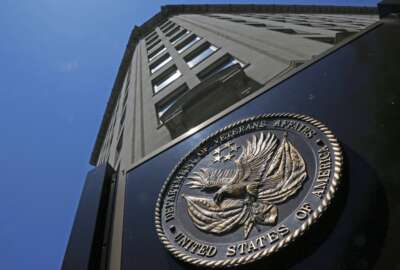Hubbard Radio Washington DC, LLC. All rights reserved. This website is not intended for users located within the European Economic Area.
On Air: Federal News Network
Trending:
Federal pay freeze Q&A
Your most commonly asked questions about the federal pay freeze are answered.
The federal pay freeze has officially been signed into law. So, what happens next?
Many questions remain about the implementation of the pay freeze. More guidance from the Office of Personnel Management is expected in the next few weeks.
You’ve been emailing Federal News Radio with your questions about the pay freeze. We’ve put together a list of your most commonly asked questions and the answers to them.
If you have a question that isn’t addressed below or isn’t answered in our pay freeze story, please email us or post a comment and we’ll do our best to get an answer for you.
We will continue to answer your questions in this space, so check back often to see what’s new.
For complete coverage from Federal News Radio on the proposed federal pay freeze and pay debate in general, click here.
Unanswered Questions:
Federal News Radio continues to work on answers to the following questions.
- How will the pay freeze affect employees under the National Security Personnel System (NSPS)?
- How will the pay freeze affect hiring?
January 4, 2011 Update:
- The Office of Personnel Management has issued a memo further detailing the pay freeze, which is now in effect, and for the first time also provided exclusions to the pay freeze. According to OPM’s memo: “[e]mployees of the United States Postal Service and the Postal Regulatory Commission are not covered, nor are members of the uniformed services (as defined in 37 U.S.C. 101(3), i.e., Army, Navy, Air Force, Marine Corps, Coast Guard, National Oceanic and Atmospheric Administration, and Public Health Service). Except for Legislative branch employees covered by the General Schedule, the pay freeze legislation does not apply to employees outside the Executive branch.”
Q: What impact will the pay freeze have on raises negotiated under collective bargaining agreements?
A: The pay freeze will not affect any pay raises required by current collective bargaining agreements. The OPM memo states, “The pay freeze policy in the Presidential memorandum may not, as a matter of Federal sector labor law, apply to any increase that is required by a collective bargaining agreement that has already been executed and is in effect as of the date of the Presidential memorandum.”
Q: Are performance awards/bonuses affected by the pay freeze?
A: No. According to the OPM memo: “[e]mployees may continue to receive additional payments such as performance awards/bonuses; recruitment, relocation, and retention incentives; and premium payments (e.g., overtime pay).”
December 23, 2010 Update:
- The White House has issued a memo with more details on the pay freeze, which will go into effect on January 1, 2011. According to the memo, “[t]he Act freezes statutory pay adjustments for all executive branch pay schedules for a two-year period.” OPM provided the adjusted rates of pay.
Q: Are performance-based pay systems affected by the pay freeze?
A: Yes. According to the memo released by the White House, the Act “generally prohibits executive departments and agencies from providing any base salary increases at all to senior executives or senior level employees, including performance-based increases.” It goes on to say, “To the extent that an agency pay system provides performance-based increases in lieu of general increases, funds allocated for those performance-based increases should be correspondingly reduced to reflect the freezing of the employees’ base pay schedule.”
Q: Will federal employees still be eligible for within-grade step increases?
A: Yes. The Office of Management and Budget tells Federal News Radio that feds will still be eligible for step increases and the increase in pay that comes with those step increases. (See Pay Rate chart.)
December 22, 2010 Update:
- The pay freeze was passed by Congress on Dec. 21, 2010 as part of the continuing resolution. More guidance on the implementation of the pay freeze should be forthcoming in the next few weeks from the Office of Personnel Management.
See how the pay freeze is worded in the continuing resolution by clicking here (Pages 1-2, SECTION 1, SUBSECTION 147).
December 20, 2010 Update:
- Q: How will the proposed pay freeze make its way through Congress?
A: The pay freeze is now a part of the continuing resolution being considered by the Senate. The Senate is expected to vote on the CR Tuesday, Dec. 21. It would fund the government through March 4, 2011.
Q: How will the pay freeze affect contractors?
A: Some contractors are starting to feel the pain of the proposed pay freeze as well. Energy Secretary Steven Chu announced that his department will also freeze salaries and bonus pool increases of contractors who operate Energy’s facilities. The freeze will cover 28 locations and 75,000 contractor workers. They perform maintenance, operations and research. The freeze for contractors would begin January 1, 2011.
December 17, 2010 Update:
- Q: How will the proposed pay freeze make its way through Congress?
A: The Senate has dropped its push for an omnibus spending bill that would have funded the government through FY 2010. This bill included a two-year pay freeze for federal employees. The House has already passed a continuing resolution that includes the proposed pay freeze and keeps spending at 2010 levels. The current CR runs out at midnight on Sunday, December 19, 2010. A new CR must be passed to keep the government running.
December 15, 2010 Update:
- Q: How will the proposed pay freeze make its way through Congress?
A: The Senate is expected to vote this week on an omnibus bill that includes a two-year pay freeze for federal employees. The House bill also includes the two-year pay freeze proposed by President Obama. However, unlike the Senate omnibus bill, the House bill is a continuing resolution that keeps spending at 2010 levels.
Questions from December 6, 2010:
- Q: When a pay freeze is instituted, what happens to feds whose raises have been negotiated by union contracts?
A: This answer comes to Federal News Radio from the Federal Labor Relations Authority – “Federal employees generally do not have the ability to negotiate over their pay and/or the annual cost of living pay increase. There is a very limited number of Federal employees that have the ability to negotiate pay matters, and their pay is not governed by the GS pay system – they have their own pay authorities and system. As a result, it really depends on the terms of the legislation freezing pay – if it covers only the GS, WG, etc employees, then it would not affect those who have negotiated their ‘raises;’ if it is broader, then it could potentially render portions of the contract unenforceable. Again, it really depends on the legislation.”
Q: Are lawmakers trying for an omnibus before the calendar year ends? Also on the CR: why December 18 vs. funding gov’t at least beyond the holidays? (Updated – See Above)
A: The answer comes to us from a few places. First from a Democratic aide in the House,”Q 1: a year-long vehicle is being sought,” and “Q2: because we are trying to get a year-long vehicle.” Then congressional watchers Chuck Marr, the director of federal tax policy at the Center for Budget and Policy Priorities, and Ian Swanson, news editor at The Hill newspaper, told Federal News Radio the December 18th target date was to give Democrats (currently in control of Congress) more time to try to pass an omnibus package before handing over the reins.
Questions from December 3, 2010:
- Q: Are the salaries of congressional staffers affected by the pay freeze?
A: No. Congressional staffers are paid out of legislative branch funding dictated by the Speaker of the House.
Q: When will Congress vote on the pay freeze? (Updated – See Above)
A: To be determined. It is unclear if the pay freeze will be voted on in the lame-duck session of Congress or if it will be passed off to the 112th Congress. It is also uncertain how the pay freeze proposal will make its way through Congress (attached to an existing bill or introduced as a separate measure.)
Q: Will there be a job freeze as well?
A: The President’s proposal does not include anything about a job/hiring freeze.
Questions from December 2, 2010:
- Q: Why are U.S. Postal Service employees exempt from the pay freeze?
A: Federal News Radio Senior Correspondent Mike Causey says, “Short answer is that since the 1970s the highly-unionized postal workers have bargained separately over wages and some working conditions. The USPS is not a high-wage federal operation and it’s been having money problems for years. The contract between the USPS and the American Postal Workers Union expired Dec. 1, 2010. The Postal Service is seeking concessions. So, while postal workers are ‘exempt’ from the freeze, they aren’t exactly basking in sunshine either.”
Q: Will pay increases negotiated by the National Treasury Employees Union still be awarded if the pay freeze is passed?
A: NTEU National President Colleen Kelley tells Federal News Radio, “The answer to that is unclear. NTEU has not yet seen the pay freeze legislation.” NTEU plans to update Federal News Radio as soon as more information is available.
Q: What are the locality pay rates for Hawaii and Alaska in 2011 and 2012?
A: The locality pay rate for federal employees in Hawaii has been set at 11.01 percent in 2011 while feds in Alaska will see a 16.46 percent locality pay rate. In 2012, the locality pay rate for federal employees in Hawaii will be 16.51 percent and feds in Alaska will get a 24.69 percent locality pay rate. Feds in Alaska and Hawaii are on a phased in locality pay scale. Under the Non-Foreign Area Retirement Equity Assurance Act of 2009, feds in Alaska and Hawaii were granted a locality pay increase in phases starting in 2010 with a 33 percent increase each year through 2012. Check out the full list of locality pay rates and read the President’s letter about alternative pay plans.
Questions from December 1, 2010:
- Q: Are congressional salaries included in the proposed federal employee pay freeze?
A: No. But Congress will NOT be getting a pay raise in 2011. Congress’s pay raises are automatic, however Congress voted this year to nix its automatic raise. It’s the second year in a row that Congress acted to not receive its cost-of-living increase.
Q: Does the pay freeze affect cost-of-living adjustments?
A: No. Cost-of-living adjustments are a separate issue from the pay freeze. COLAs are applied to retirement pay and are based on inflation statistics. It had already been announced that there will be no COLA in 2011.
Q: Does the pay freeze affect civil service retirees?
A: No (see above.)
Q: If Congress does pass the pay freeze, will health insurance rates still go up?
A: Yes. Federal News Radio Senior Correspondent Mike Causey says this is the perfect time to take a look at your health insurance and decide if your current plan gives you the best bang for your buck. Federal employees have until Dec. 13, 2010 to make changes to their health plans during open season.
Questions from November 30, 2010:
- Q: Is the pay freeze a done deal?
A: No. The pay freeze is a proposal by President Barack Obama that still needs to be approved by Congress. So, how likely is it to pass? Federal News Radio senior correspondent Mike Causey says it’s essentially a “done deal.”
Q: What does the pay freeze mean for my locality pay?
A: If the pay freeze is passed, locality pay will remain at 2010 levels while the pay freeze is in effect. So, if a fed’s base pay includes an extra 15 percent for locality pay, they will continue to get that same 15 percent during the pay freeze.
Q: What does the pay freeze mean for step or within grade (WGI) increases? Will they be affected by the pay freeze?
A: An Office of Management and Budget official tells Federal News Radio, “employees will still be eligible for step increases.”
Q: What does the pay freeze mean for promotions?
A: The pay freeze would not affect an employee’s ability to receive more money through a promotion.
Q: What does the pay freeze mean for bonuses?
A: According to an OMB official, “OMB and OPM are evaluating the system of performance awards and in no case will the total amount of bonuses for 2011 exceed the 2010 level.”
Q: Which federal employees are affected by the pay freeze?
A: The pay freeze would apply to all civilian federal (non-postal) employees, including those in various alternative pay plans and those working at the Department of Defense – but not military personnel.
Copyright © 2024 Federal News Network. All rights reserved. This website is not intended for users located within the European Economic Area.
Related Topics




